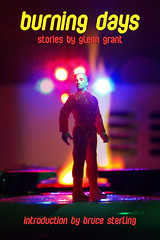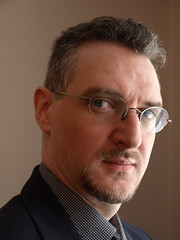One of the highlights of my year is coming up fast: Readercon — it’s the most fun you can have with your brain.
My schedule this year looks like this:
Friday July 15
6:00 PM F The Dissonant Power of Alternative Voicing. Glenn Grant, Paul Levinson, Kate Nepveu, Kenneth Schneyer (leader), Howard Waldrop. At Readercon 21, there was a panel discussion on the use of documentary text in fiction to lend “authority” to the voice. It can be argued, however, that alternative voicing strategies, particularly the use of documents, framing narratives, etc., are powerful precisely because they are not authoritative. Readers know that they are reading an incomplete version of the document, and consequently are led to imagine what is not being said. What lurks in the interstices between texts? What is this particular document-writer failing to say, or deliberately omitting? This panel will explore the use of dissonance occasioned by indirect voicing to make the reader a fuller, more active participant in the process of creating the fiction.
9:30 PM VT Reading. Glenn Grant. Grant reads “Flowers of Avalon,” a new SF/horror story from his collection Burning Days.
Saturday July 16
2:00 PM F Location as Character. Greer Gilman, Glenn Grant, Elizabeth Hand (leader), Michael Aondo-verr Kombol, Yves Meynard, Madeleine Robins. We can read certain authors whose mere invocation of a previously described location adds a level of depth to the story, such as Lovecraft’s Innsmouth or Elizabeth Hand’s Kamensic. The idea of fictional locations as characters in their own right is one that has been explored many times before, so let’s talk about the techniques and reasons for doing so. The reasons for an author to re-use a locale seem fairly obvious, but are there reasons not to do so? What are some of the challenges in describing a reality-based location powerfully enough to transport a reader? Panelists will discuss their favorite scene-setting techniques, as well as locations in other writer’s works that have felt real and solid for them.
Sunday July 17
12:00 PM F A Fate Worse than Death: Narrative Treatment of Permanent Physical Harm. John Crowley, Glenn Grant, Mary Robinette Kowal, JoSelle Vanderhooft, Alicia Verlager (leader). Cinderella’s sisters cut off parts of their feet. Rapunzel’s prince loses his eyes to a thorn bush. But in present-day fantasy, it seems less shocking to kill a character than to significantly and permanently damage their physical form; witness the thousands of deaths in George R.R. Martin’s Song of Ice and Fire series that don’t get nearly as much airtime as one character losing a hand. What changed–for storytellers, and for audiences? How does this fit in with our culture’s mainstream acceptance of violence alongside an obsession with youth and physical perfection? As medical advances help people survive and thrive after drastic injuries, will there be more stories that explore these topics?
2:00 PM G Effing the Ineffable: Writers Who Think Cinematically. John Crowley (leader), Glenn Grant, Andrea Hairston, Maria Dahvana Headley, Ben Loory. Some writers, by their own account, tend to think more visually or cinematically than others. Think of John Steinbeck’s Californian landscapes or, in the SF field, George R. Stewart’s Earth Abides or William Gibson’s Neuromancer. Is it reasonable to think of such writers as not working primarily (or initially) in words? If so, how do they get their particular version of the ineffable down on paper? And how do we experience it as readers?
I’m getting excited already — aren’t you?


